Current Fellows
The CCB currently supports post-doctoral Fellows working at most NIH Institutes with neuroscience research. The fellows' research focus span a wide range of topics related to compulsive behaviors, that include synaptic mechanisms driving compulsive drug taking, neural circuitry that mediates relapse, and behavioral paradigms that promote compulsive overeating.
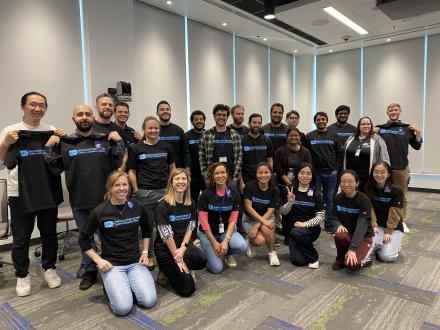
First Year Fellows
Yili Zhao, Ph.D. (NCCIH)

Yili is a visiting postdoctoral fellow at the Section on Affective Neuroscience and Pain, under the guidance of Dr. Lauren Atlas at the National Center for Complementary and Integrative Health (NCCIH). Her research investigates the mechanisms underlying social reinforcement learning of other’s expressions of pain. Her CCB project explores the impact of alcohol consumption, believed to modify social cognition, on the recognition and learning of painful facial expressions.
Yili earned her Ph.D. in Natural Sciences, with a specialization in Psychology, from University of Vienna, under the mentorship of Dr. Claus Lamm. Her doctoral research focused on understanding the neural underpinnings of empathy and emotion recognition of pain and disgust in human. She employs a broad spectrum of investigative methodologies, including behavioral measures, univariate and multi-voxel fMRI analysis, computational modeling, and psychopharmacological administration.
Bharath Chandra Talluri, Ph.D. (NEI)
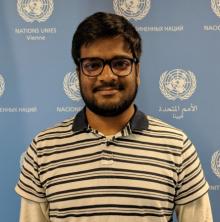
Dr. Talluri is a visiting fellow in the Visual Decision-Making section led by Dr. Hendrikje Nienborg at the Laboratory of Sensorimotor Research. At NIH, he is investigating the neurophysiological mechanisms underlying decision-making and visual perception using electrophysiological methods in non-human primates. His CCB project aims to identify the neural basis of abstract perceptual choices and the interplay between motivational states and decision-making behavior.
Dr. Talluri attained his Bachelors in Electrical Engineering from Indian Institute of Technology Roorkee, Masters in Cognitive Science from University of Edinburgh, UK, and PhD in Cognitive Neuroscience from the University Medical Center Hamburg- Eppendorf, Germany. During his PhD, he investigated the mechanistic and neural basis of choice-induced biases in decision-making. His research primarily addresses how the brain combines external evidence with internal beliefs and states to choose a course of action using complementary approaches like psychophysics, neuroimaging (fMRI & MEG), pupillometry, electrophysiology, and computational modeling. Bharath is a coffee-lover and underwent training as a barista.
Lee Peyton, Ph.D. (NIAAA)
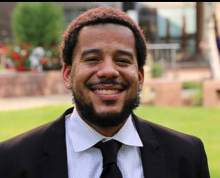
Dr. Lee Peyton is currently an IRTA postdoctoral researcher in the Laboratory for Integrative Neuroscience at NIAAA. His project with the CCB aims to investigate the role of the dorso-lateral-striatum (DLS) dopamine D1 spiny projection neurons to the substantia nigra reticulata (SNr) in habitual alcohol seeking.
Dr. Peyton received his Ph.D. in Molecular Pharmacology and Experimental Therapeutics from Mayo Clinic in Rochester, MN. He uses behavioral, pharmacological, and physiological techniques to investigate how cell specific brain circuits are involved in alcohol consumption and substance use disorders. Outside of work, he enjoys fishing.
Kathryn Biernacki, Ph.D. (NIDA)

Dr. Biernacki is a Research Fellow in the Cognitive and Pharmacological Neuroimaging Unit of the National Institute on Drug Abuse Intramural Research Program, under the guidance of Dr. Amy Janes. Her works focuses on understanding how novel interventions impact neural mechanisms of decision-making and craving in people with substance use disorders. She is currently studying how orexin antagonism modulates the neural correlates of craving and reward in people who use nicotine. Dr. Biernacki’s CCB project will focus on modulating decision-making in people with opioid use disorder using functional-connectivity guided neurostimulation.
Dr. Biernacki received her Ph.D. in Psychology in 2018 from the Australian Catholic University in Melbourne. She then completed a post-doctoral fellowship at Rutgers University in 2022, where she studied how craving impacts decision-making using computational psychiatry methods, as well as the impact of brain stimulation on reward processing in people with opioid use disorder. In her spare time, Kathryn enjoys cooking, yoga and traveling.
Pamela Miranda Tapia, Ph.D. (NIDA)
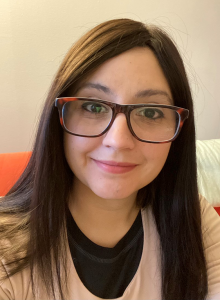
Pam is a postdoctoral fellow in the Neuronal Circuits and Behavior Section, led by Dr. Yeka Aponte at the National Institute on Drug Abuse. She is interested in understanding the neural circuits that underlie survival behaviors such as feeding as well as the addictive and rewarding properties of food. Her CCB project aims to understand the mechanisms that underlie the effects of diet-induced obesity and bariatric surgery on hypothalamic feeding circuits using a combination of electrophysiology, functional imaging, and behavior.
Pam received her PhD in Neuroscience from the University of Alberta, where she focused on the neural control of breathing. She is a certified diver and in her spare time she enjoys painting.
Ido Maor, Ph.D. (NIDA)
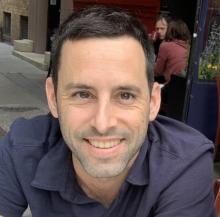
Ido is a Postdoctoral Fellow in Dr. Geoffery Schoenbaum lab within the Behavioral Neurophysiology Neuroscience Section of the National Institute on Drug Abuse (NIDA). As a CCB Fellow, Ido uses electrophysiology to record neurons from the Orbitofrontal cortex and other upstream and downstream cortical areas in freely moving rats while they learn to solve multiple problems, involving similar learning materials but very different rules. His goal is to test whether co-representation of these contradictory rules correlates with the ability to accurately deploy the correct behavioral schema.
Ido received his PhD in computational neuroscience from the Hebrew University in Jerusalem in 2017. As a graduate student, he studied the neural substrate of auditory perceptual learning. In his free time, he enjoys hiking with his family and playing the drums.
Ken Negishi, Ph.D. (NIDA)
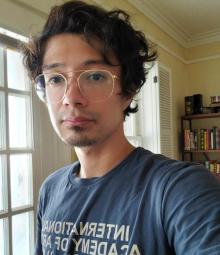
Ken is a postdoctoral fellow in the Behavioral Neuroscience Research Branch at NIDA under the guidance of Dr. Yavin Shaham. His CCB project aims to use rat models of voluntary abstinence from drugs to study the incubation of craving phenomenon. Ken hopes that his work will improve our understanding of mechanisms and neural circuits of relapse to drug seeking.
Ken began as a student of neuroanatomy at the University of Texas at El Paso. His graduate work focused on mapping connections of the rat prefrontal cortex using pathway tracing and interpretation of Nissl stains. Outside of the lab, he enjoys cooking/baking, fiction, and getting himself hurt while trying to land skateboarding tricks.
Claire Gao, Ph.D. (NIDDK)
CCB Project Title:
The role of parabrachial nucleus and its inputs from area prostrema in signaling semaglutide-mediated weight loss and suppression of overeating
Mandy Renfro, Ph.D. (NIMH)
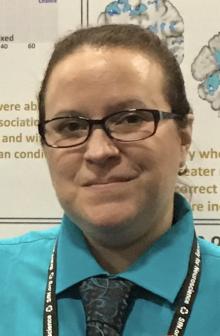
Dr. Amanda Renfro is a cognitive neuroscientist serving as a postdoctoral fellow in the Computational Decision Neuroscience Laboratory at the National Institute of Mental Health (NIMH) under Dr. Silvia Lopez-Guzman. Dr. Renfro earned a B.S. in Psychology and terminal M.S. in Experimental Psychology from Eastern Kentucky University, then went on to receive a non-terminal M.S. in Psychology and her Ph.D. in Cognitive Neuroscience from Florida International University under the mentorship of Dr. Aaron Mattfeld. Her research interests focus primarily on cognitive processes which influence decision-making, as well as the neurobiological mechanisms which give rise to these phenomena. In her doctoral studies, Dr. Renfro used functional neuroimaging techniques to investigate prospective memory-guided decision-making and is now interested in how value and pain may also influence choice for both clinical and non-clinical populations.
Siyu Wang, Ph.D. (NIMH)

Siyu is a postdoctoral fellow in the Section on Learning & Decision Making, led by Dr. Bruno Averbeck at the National Institute of Mental Health. His research investigates the neural circuitry and computational mechanisms underlying goal-directed behavior.
He received his B.S. in Mathematics at University of Science and Technology of China in 2015, and his Ph.D. in Psychology from University of Arizona in 2020. His past work studied the computational mechanism of explore-exploit decisions in humans and rodents.
Franco Giarrocco, Ph.D. (NIMH)
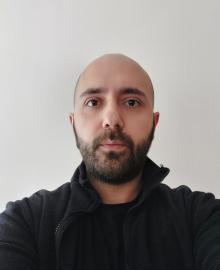
Franco is a postdoctoral fellow in the Section on Learning & Decision Making led by Dr. Bruno Averbeck at the National Institute of Mental Health. His research investigates how motivational and motor-related regions across cortico-basal ganglia circuits integrate stimulus-value information with motor information to drive reinforcement learning. His CCB project combines the comparison of human and non-human primates’ behavior during reinforcement learning tasks and large-scale neuronal recordings in non-human primates.
Franco earned his B.S. in Biology from the University of Ancona (Italy) in 2011, M.Phil. in Neurobiology in 2015, and Ph.D. in Behavioral Neuroscience from Sapienza University of Rome (Italy) in 2020. His past work investigated the behavioral and neuronal mechanisms of selective inhibition, as well as perceptual and motivational aspects underlying the inhibitory control of movements in non-human primates.
Ryan Lingg, Ph.D. (NIMH)
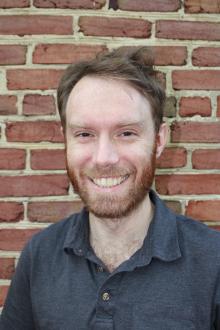
Ryan is a Postdoctoral Fellow working with Dr. Mario Penzo in the Section on the Neural Circuits of Emotion and Motivation at the National Institute of Mental Health (NIMH). His research investigates the neural mechanisms underlying defensive behaviors and how these are altered during stress. His CCB project focuses on characterizing neural activity in thalamo-cortical projections in response to threatening stimuli during metabolic challenges.
Ryan earned his Ph.D. in Behavioral Neuroscience from the University of Iowa under the mentorship of Dr. Jason Radley. During his Ph.D., Ryan worked to investigate neural circuit control of stress hormone release and how these contributed to fear generalization.
Kelsey Sundby, Ph.D. (NINDS)
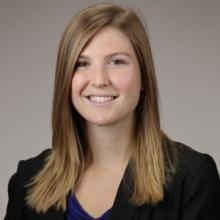
Kelsey is a Postdoctoral Fellow working with Dr. Kareem Zaghloul at the National Institute of Neurological Disorders and Stroke. Kelsey is interested in how top-down control processes affect memory and behavior. As a CCB fellow, Kelsey will test the role of a frontal-basal ganglia network in flexible decision-making using intracranial neural recordings from patients undergoing deep brain stimulation surgery.
Kelsey received her PhD in Experimental Psychology with an emphasis in cognitive and behavioral neuroscience from the University of California San Diego. Under the mentorship of Dr. Adam Aron, Kelsey’s doctoral research studied the neural mechanisms underlying executive control over both actions and memory. Outside of the lab, you’ll find Kelsey running, hiking or exploring new restaurants in D.C.
Second Year Fellows
Khushbu Agarwal, Ph.D. (NIAAA)

Currently as a postdoctoral visiting fellow in the SenSMet unit, NIAAA at NIH, Dr. Khushbu Agarwal is working with Dr. Joseph’s group to study the link between chemosensation, brain function, and behavior in addictive conditions such as obesity, and alcohol use disorder (AUD). The focus is to understand the reward associated neural mechanisms associated with chemosensory and physiological changes in obesity and AUD individuals. To address the objective of her study a battery of psychophysical, physiological, cognitive, and neuroimaging assessments are conducted. She has been granted the prestigious CCB NIH fellowship in 2022 and her CCB project aims at characterizing the olfactory function of the AUD individuals and determine the functional brain cue reactivity to rewarding odor stimuli and explore if inflammation is associated with the olfactory measures and altered cue reactivity craving and reward responses in AUD population.
She has completed her Ph.D. studies from All India Institute of Medical Sciences (AIIMS), New Delhi, India in the year 2018. During her Ph.D studies she gained extensive experience in molecular biology and multimodal MRI techniques in clinical population like patients with breast cancer and brain disorders including obsessive compulsive and bipolar disorders.
Diana Burk, Ph.D. (NIMH)

Diana is a postdoctoral fellow in the Section on Learning & Decision Making, led by Dr. Bruno Averbeck at the National Institute of Mental Health. Her research investigates the neural representation of primary and secondary rewards and motivation during reinforcement learning. Her CCB project involves combining computational modeling and electrophysiology in awake, behaving non-human primates to measure neural activity during learning.
She received her B.S. in Biomedical Engineering from the University of Virginia in 2011, M.Phil in Neuroscience from the University of Cambridge in 2013, and her Ph.D. in Neuroscience from Brown University in 2020. Her past work has been in various areas of neuroscience, including the neural control of movement, perceptual decision making, and visual object recognition in humans and non-human primates.
In her free time, she enjoys exploring trail systems through running and bike racing.
Tommy Gunawan, Ph.D. (NIAAA)

Dr. Tommy Gunawan is a Visiting Postdoctoral Fellow at the Human Psychopharmacology Laboratory and Office of the Clinical Director under the guidance of Dr. Vijay Ramchandani at NIAAA. He is currently investigating the neurofunctional domains underlying alcohol use disorder. His CCB project will look at the interactions between ALDH2 polymorphism and famotidine on alcohol response, alcohol reward, alcohol motivation, and metabolism in both clinical and preclinical models. His goal is to understand drug-seeking and polydrug use behavior and to develop methods for translating between preclinical and clinical research.
Dr. Tommy Gunawan was born in Indonesia, grew up in Singapore, and completed his undergraduate and graduate studies in the United States. He earned his Ph.D. in Behavior, Cognition, and Neuroscience from American University in 2020. He is interested in the neuropsychopharmacology of addictive drugs. He enjoys nature, hiking, cooking, and chess.
Tingting Liu, Ph.D. (NIDA)

Dr. Tingting Liu is currently a postdoctoral researcher in Technology and Translational Research Unit in Translational Addiction Medicine Branch, at NIDA IRP. Her project within the CCB aims to investigate the neural mechanisms and behavioral consequences of alcohol-related stigma among heavy drinkers.
Dr. Tingting Liu received her Ph.D. in psychology from the University of Michigan. She utilizes novel interdisciplinary methodologies from psychology, neuroscience, and computational text analysis to investigate social relationships in mental health and substance use behaviors. She likes travelling and photography.
Zilu Ma, Ph.D. (NIDA)

Zilu is a Post-doctoral Fellow in Dr. Yihong Yang’s lab at the National Institute on Drug Abuse (NIDA). As a first year CCB Fellow, Zilu will study role of dorsal striatum circuits in relapse to opioid seeking by combining functional magnetic resonance imaging (fMRI), pharmacological inactivation, and intermittent theta burst stimulation (iTBS) methods.
Zilu received her Ph.D. degree in Biomedical Engineering from The Pennsylvania State University in 2020. Her Ph.D. concentrated on developing awake resting-state fMRI methods to study brain function by incorporating it with different neuroimaging, behavioral, and neuromodulation methods in animal models.
Aijaz Naik, Ph.D. (NIMH)
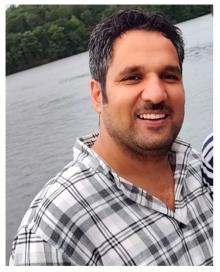
As a 2022 CCB Fellow, Aijaz is employing neuron tagging, whole brain imaging, behavior, transgenic and optogenetic strategies in mice to understand the neural circuits and mechanisms of frustration-effect following withholding of expected rewards. Disentangling the neural circuits mediating frustration will shed light on how dysfunction in dedicated circuits may lead to low frustration tolerance and propensity for aggression seen in Children and Teens with Irritability. Neuroscience of irritability is still in infancy, Aijaz aims to generate fresh insights that would aid translational efforts and precise therapeutics for irritability.
Aijaz joined NIH-IRP as a postdoctoral fellow in March 2021. He is currently a Research Fellow in Section on Synapse Development Plasticity in Zheng Li’s group at the National Institute on Mental Health (NIMH).
Aijaz received his Ph.D. from India, where he studied how intragenerational Protein malnutrition affects gliogenesis and cognitive functioning in F1 progeny rats. Aijaz moved to University of Virginia, School of Medicine as a Postdoctoral fellow (2018-2021), where he investigated mechanisms of seizure induced amnesia using activity dependent tagging of memory and seizure engrams, electrophysiology, and mouse behavior.
Outside of the lab, Aijaz loves to cook new recipes and hiking occasionally.
Katherine Savell, Ph.D. (NIDA)

Katherine E. Savell, Ph.D., is a postdoctoral fellow in the laboratory of Dr. Bruce Hope in the Behavioral Neuroscience Research Branch of the National Institute on Drug Abuse Intramural Research Program. Her postdoctoral research focuses on understanding how drug-related associations are encoded and maintained in the brain by leveraging single nuclei RNA-sequencing and neuronal activity-dependent transgenic tools in preclinical relapse models.
Katherine earned a Ph.D. in Genetics, Genomics, and Bioinformatics, with a focus in neuroscience, from the University of Alabama at Birmingham. Outside of the lab, Katherine can be found in her garden or stained glass studio with a cat by her side.
Sunday Francis, Ph.D. (NIMH)
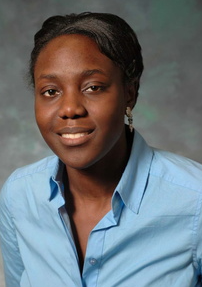
Dr. Sunday M. Francis is a research fellow. Currently, she is a member of the Noninvasive Neuromodulation Unit helmed by Dr. Sarah H. Lisanby where her research interests include utilizing noninvasive brain stimulation to further understand neurodevelopmental disorders (NDDs) (e.g., autism, pediatric OCD, and ADHD) and the potential use of these techniques in treatments that target transdiagnostic symptoms of NDDs.
She was awarded the CCB Fellowship in 2022 to utilize noninvasive neuromodulation, specifically transcranial magnetic stimulation (TMS), to probe networks associated with compulsivity and impulsivity in dimensionally measured non-clinical populations. A long-term goal of this research is to optimize TMS to treat individuals with impairments driven by these neurocognitive endophenotypes.
Dr. Francis completed her PhD in Computational Neuroscience from the University of Chicago exploring neuroplasticity in cortical motor areas. During her post-doctoral training at the University of Minnesota, she researched autism spectrum disorder (ASD) utilizing molecular techniques, eye-tracking, imaging, and other methods to investigate brain connectivity and the underlying neural mechanisms of this condition. Additionally, during her time at Minnesota, Dr. Francis developed non-invasive brain stimulation techniques through collaborations in cerebral palsy and NDDs.
Third Year Fellows
Yosuke Arima, Ph.D. (NIDA)
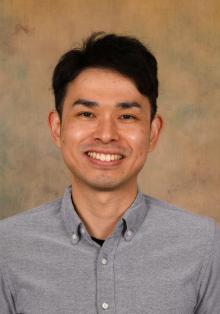
Yosuke is a postdoctoral fellow in the laboratory of Dr. Satoshi Ikemoto at National Institute on Drug Abuse (NIDA). His research interests are to understand neural mechanisms of motivation and reward. Especially, he investigates hypothalamic nuclei in reward-seeking and nicotine reinforcement behavior, using optogenetic and fiber photometry procedures in freely moving mice. In addition, he is developing a new mouse nicotine self-administration model.
Yosuke received his Ph.D. from Hiroshima University in Japan where he studied neurotoxic mechanism of organophosphorus agent such as sarin in vitro. He then joined the Department of Anatomy at Shimane University School of Medicine where he studied the projections of parabrachial neurons to orexin neurons. Yosuke enjoys basketball, jogging, biking, and hiking outside of the lab.
Nicholas Beacher, Ph.D. (NIDA)
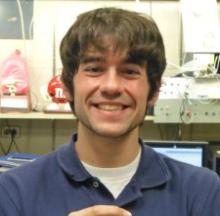
Nicholas is a Postdoctoral Fellow in Dr. Da-Ting Lin’s laboratory within the Neural Engineering Section of the National Institute on Drug Abuse (NIDA). As a CCB Fellow, Nicholas uses miniScope in vivo imaging to record neurons from freely moving transgenic rats to study how reward seeking behaviors are correlated with limbic neural activity. His longterm goal is to use miniScopes to uncover how choices are represented in the brain such as when animals choose to take, or ignore, opportunities to self-administer drugs of abuse.
Nicholas received his Ph.D. in Psychology: Behavioral and Systems Neuroscience from Rutgers University in 2020. At Rutgers he used electrophysiological techniques to study drug cue processing in rats self-administering cocaine. In his free time, Nicholas enjoys playing sports, fishing, and kayaking.
Adam Caccavano, Ph.D. (NICHD)
Adam is a post-doctoral CCB fellow interested in neuronal diversity and inhibitory micro-circuitry. In the lab of Dr. Chris McBain, Adam’s research focuses on how opioids modulate inhibition across different brain regions, species, and development.
Adam started his training in physics, earning a B.S. from the University of Oregon and M.S. from Portland State University. He then completed his Ph.D. in neuroscience at Georgetown University in the lab of Dr. Stefano Vicini, where his research focused on how inhibitory microcircuits become disrupted in Alzheimer’s disease.
Ying Duan, Ph.D. (NIDA)

Ying Duan is a postdoctoral fellow in the laboratory of Dr. Yihong Yang at the National Institute on Drug Abuse (NIDA). As a 2021 CCB Fellow, Ying focused on the involvement of lateral habenula circuits in compulsive drug-taking behaviors in rats, combining magnetic resonance imaging with pharmacological or DREADDs modulation technologies.
Ying received her Ph.D. in healthy psychology at the University of the Chinese Academy of Sciences in 2019. Her Ph.D. work focused on exploring the roles of L-type calcium channels in incubation of cocaine craving in the tree shrew (Tupaia belangeri) model. During her post-doc training, she is working on exploring neuronal mechanisms on compulsive drug-taking in rats.
Ayland Letsinger, Ph.D. (NIEHS)
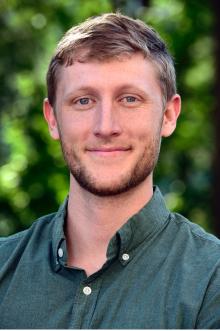
Dr. Letsinger is a 4th year postdoctoral fellow in the Ion Channel Physiology Group of the Neurobiology Lab at the National Institute of Environmental Health Sciences under the mentorship of Drs. Jerrel Yakel and Guohong Cui. He is currently studying brain circuits that are responsible for the initiation and persistence of wheel running in mice using fiber photometry and chemogenetics.
Dr. Letsinger received his PhD in Exercise Physiology as he found physical health to be essential for a happy life. He hopes to one day find a way to increase the pleasure associated with physical activity so more people will participate and gain the many benefits.
Thien Nguyen, Ph.D. (NICHD)

Thien is a Postdoctoral Visiting Fellow at the Section on Translational Biophotonics under Dr. Amir Gandjbakhche. In her lab, she involves in many different projects such as development of a wearable device to monitor pregnancy health and utilization of a multimodal NIRS/EEG to identify early neuronal biomarkers of autism disorder spectrum in infants and toddlers. As a CCB fellow, Thien proposed to investigate the correlation between the autistic traits and the frontal functional connectivity during a resting state and during an inhibition task. Her long-term goal is to identify cerebral functional connectivity networks, which can be used to predict autism in infants and toddlers.
Thien received her PhD in biomedical engineering from Gwangju Institute of Science and Technology in 2019. During her PhD program, she developed and applied optical systems to monitor cerebral hemodynamic responses in different cognitive states and to measure tissue oxygen saturation.
Thien can memorize a broad map but often fail to recognize left and right sides. If you ask her direction to go somewhere, it is better to ignore what she says but follow where she points.
Lorenzo Sansalone, Ph.D. (NINDS)
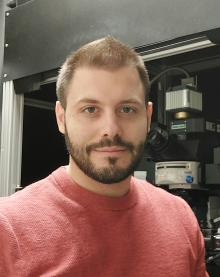
Lorenzo is a postdoctoral scientist in the laboratory of Dr. Zayd Khaliq at the National Institute of Neurological Disorders and Stroke (NINDS) where he studies the cellular neurophysiology of dopaminergic transmission. Lorenzo was first awarded the CCB fellowship in 2021 to explore the intrinsic physiological properties of motor- and non-motor related dopaminergic subpopulations, within the midbrain, in order to better understand how their physiology can shape common phenotypic behaviors observed in pathological conditions involving the basal ganglia, such as Parkinson’s disease (PD), obsessive-compulsive disorder (OCD) and schizophrenia. Lorenzo’s long-term interest is to elucidate unknown neuronal physiological properties and pathways to identify novel biological targets for the development of more effective therapeutics for CNS-related disorders.
Lorenzo earned a Laurea Diploma (BSc + MSc) in Medicinal Chemistry and Pharmaceutical Technologies from the University of Milan (Italy) in 2013 and received a PhD in Organic Chemistry from the University of Miami (USA) in 2018. After a 2-year appointment, as a postdoctoral fellow, in the Department of Neuroscience of the Icahn School of Medicine at Mount Sinai Hospital in New York City, Lorenzo joined the cellular neurophysiology section of NINDS in 2020 as a postdoctoral researcher.
Sudhuman Singh, Ph.D. (NCCIH)

Dr. Sudhuman Singh is a visiting post-doctoral fellow at the Section on Behavioral Neurocircuitry and Cellular Plasticity, led by Dr. Yarimar Carrasquillo at National Center for Complementary and Integrative Health (NCCIH). As a 2021 CCB fellow, Dr. Singh will be investigating cell type and projection specific role of CeA to zona incerta pathway in pain related affective behavior. To achieve this, he will combine aversive behavior, virus based anatomical tracing, in-vivo chemogenetics, optogenetics and fiber photometry approach to characterize and manipulate neuronal pathway.
Dr. Singh is interested in understanding the neural mechanisms underlying cognitive and neuropathological conditions and has trained in multidisciplinary research fields in neuroscience, including sleep, reinforcement learning, and pain. He earned his PhD in sleep biology from Jawaharlal Nehru University, India. Outside the lab, Dr. Singh enjoys walking, experiments in cooking, photography, spending time with family and friends.
Josephin Wagner, M.D. (NIAAA)
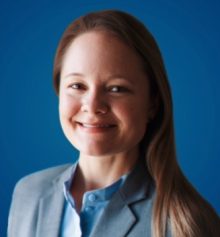
Josephin Wagner joined the Section on Clinical Genomics and Experimental Therapeutics (CGET) at NIAAA in September 2020. Her main goal is to understand the pathophysiology and neurobiology of alcohol use disorder and ischemic stroke, studying neuroinflammation, oxidative stress and blood brain barrier changes with epigenetic and pharmacological approaches. Josephin is also the associate investigator and research physician in a human clinical trial using Alirocumab in a Phase 1 study in heavy drinkers.
Josephin earned her MD at Charité - Universitätsmedizin Berlin in Germany and a MS in Medical Biology at the University of Zurich in Switzerland. Working as a researcher and a doctor in the Department of Neurosurgery at the University Hospital in Zurich, she gained a broad background in neuroscience, with specific expertise in molecular changes on the microvascular level after stroke. After her time as a postdoc, her goal is to become a US board-certified psychiatrist.
Marios Panayi, Ph.D. (NIDA)
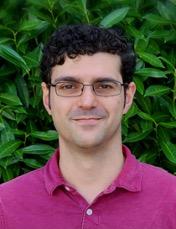
Marios is a Research Fellow in Dr. Geoffrey Schoenbaum’s lab at the National Institute on Drug Abuse (NIDA), examining the role of orbitofrontal cortex in the representation of flexible cognitive maps. As a CCB fellow, his project is focused on understanding and treating the long-term behavioral and neural changes caused by a history of cocaine self-administration in a preclinical rodent model. The project has successfully tested the therapeutic efficacy of a novel dopamine D3-receptor antagonist, developed by Dr. Amy Newman (NIDA), and is now focused on electrophysiological recording to test whether the treatment also acts upon the underlying orbitofrontal task representations that are disrupted by cocaine use.
Marios received his BPsychol. in 2009 and Ph.D. at the University of New South Wales in 2015 in Psychology. His graduate research focused on manipulating and understanding the function of the orbitofrontal cortex from a fundamental associative learning theory perspective. In 2016 he joined the labs of Prof. David Bannerman and Prof. Mark Walton at the University of Oxford. There he used a genetic mouse model relevant to schizophrenia, and in-vivo fast-scan cyclic voltammetry, to investigate how glutamatergic dysfunction can lead to a hyper-dopaminergic state that underlies aberrant salience in psychosis.
Wen-Chieh Hsieh, Ph.D. (NICHD)
CCB Project Title:
Multilayered control of KaiR1D cellular trafficking and synaptic recruitment
Geoffrey Vargish, Ph.D. (NICHD)
CCB Project Title:
Circuit dissection of dentate gyrus mossy cells and their role in pattern separation
